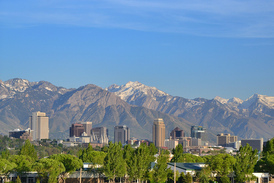
I have traveled enough to know that Utah tends to be misunderstood by many outsiders, if they have any reason to try to understand it at all. It’s the kind of place that can elicit fierce loyalty or, on the other hand, comments to the effect that one would rather die than move there.
Which lends a bit of irony to the NBC headline.
| | By now, it probably doesn’t surprise many people to see Utah at the top of lists for good places to do business. A recent Gallup-Healthways survey named Provo and Orem as cities with the highest sense of well being in the nation. In a humorous bit of clueless irony, this led to a story in the Sydney Morning Herald that ran along with a photo of two young ladies described as “Keeping things awkward in Provo.” The irony? The girls were wearing Utes gear and their hands were making the trademark “U” symbol. Talk about awkward. But amid all the accolades, it turns out Utah is a model for just staying alive. The Centers for Disease Control and Prevention has published a study that looked at each state in terms of the five leading causes of death — heart diseases, cancer, chronic lower respiratory diseases, stroke and unintentional injuries. It used a formula to determine the expected number of deaths among those 80 or younger from these causes between 2008 and 2010. Then it compared the expected deaths to the actual number to determine how many deaths in each state might have been prevented. To cut through all the details, Utah, Colorado and Vermont did quite well. States in the deep-fried South did not. Utah did so well that the report said it had absolutely no preventable deaths from cancer during the study period. The 1,931 people who died from that disease in Utah were expected to do so, apparently. Compare that to Florida, which had 5,054 preventable cancer deaths. (As an aside, Maryland was the only state recorded as having no unexpected accidental deaths, which sounds like a dictionary definition for “oxymoron.” But the state recorded a high number of heart disease deaths. The irony is that the obvious solution — getting people up and moving more — would lead to more accidents.) The CDC’s director, Tom Frieden was quoted in USA Today saying, “Your longevity and health are more determined by your ZIP code than they are by your genetic code. These deaths are not random. They are clustered by geography.” That’s all well and good until you start trying to figure out what makes certain zip codes healthier and then trying to replicate those things elsewhere. That’s what the CDC’s report recommends, telling states to “identify other states with similar populations but better outcomes,” then look for “effective policies, programs and services.” Sounds good in principle, until you get someone like former New York Mayor Michael Bloomberg, who decides to limit the amount of soft drinks people can purchase; or you get a national health program that seems to raise everyone’s blood pressure to dangerous levels. A better solution would be look at lifestyle choices and copy those, but even that won’t be easy. Despite how surprised some of us seem to be to discover it, Americans are not all alike. As USA Today explained in its report on the study, there are regional differences “in smoking habits, obesity, lack of exercise, poor diet, drug and alcohol abuse and access to medications…” A lot of Utahns simply act differently than people elsewhere because they value different things. Rather than share government policies, many of them would be happy to send a couple of representatives in white shirts and ties to explain it. The study is good news for Utahns, of course, but it won’t necessarily change how some people feel. Another recent Gallup poll measured the percentage of people in each state that want to move elsewhere. Utah came in 21st, with 31 percent pining to leave. It didn’t ask whether they were dying to do so. |

 RSS Feed
RSS Feed

